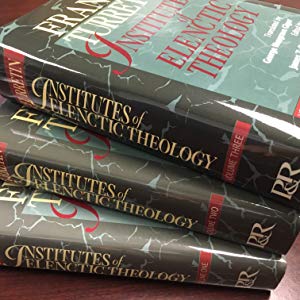
Definition: Contingent
Proposition – a contingent proposition can be true but does not have to be true.
Fact/Event – occurring without this necessarily being the case, i.e. it might not have occurred. A being is contingent if it is not logically necessary.
ON THE KNOWLEDGE OF GOD. By Francis Turretin (1623-1687).
QUESTION: Do all things fall under the knowledge of God, both singulars and future contingencies? We affirm against Socinus. [p. 206]
VIII. On the state of the question observe: (1) that a thing may be contingent in two ways—either with respect to the first cause (inasmuch as it can be produced or not produced by God, and so all creatures are contingent with respect to God because he might not have created any if he had so willed); or with respect to second causes (which can produce or not produce their effect and are thus distinguished from necessary causes). We here speak of future contingents in the latter and not in the former sense.
IX. (2) A thing can be considered either as to the certainty of event or as to the mode of production. A future contingent thing implies both; for as future it signifies the certainty of event, but as contingent the mode of production. It has the former from the decree of the first cause; the latter from the constitution of the second cause.
X. Thus the question is whether things, not any whatsoever and having a necessary cause (for there is no doubt as to these), but contingent (which have a free cause) and indifferent (adiaphoron); not logically as to the first cause, in which sense even the most necessary things are contingent (since they can be and not be), but physically (as to the contingent second cause) fall under the infallible knowledge of God, not as knowing them only indeterminately and probably, but determinately and most certainly. This the Socinians deny; we affirm… [pp. 208-209]
Sources of explanation
XX. It is not inconsistent (asystaton) for the same thing to be said to be possible and impossible at the same time (but as to different things [kat’ allo kai allo]): possible with respect to potency or the second cause (considered in itself and in a divided sense) and impossible relatively (on the hypothesis of the divine decree and foreknowledge). So it was possible for Christ not to be crucified, if God had so willed, and impossible on account of the decree. What therefore in the compound sense and on the supposition of the decree of God concerning the futurition of the thing was impossible not to take place; yet in the divided sense (and the decree being laid aside) was possible not to take place… [p. 211]
XXIII. The infallibility and certainty of the event does not take away the nature of the contingency of things because things can happen necessarily as to the event and yet contingently as to the mode of production. If there is granted a prescience of future contingent things, all things would take place necessarily by necessity of consequence, by the necessity of infallibility; not by necessity of the consequent and absolute. Therefore, there remains always this distinction between necessary and contingent things. The former have an intrinsic necessity because they arise from necessary proximate causes and are such in themselves; while the contingent, although having an extrinsic necessity by reason of the event, yet in their nature take place by contingent causes.
XXIV. The freedom of the will is indeed overthrown by a physical and coactive necessity which is at variance with the formal reason of liberty, but not by a hypothetical necessity and of the infallibility of the event, for the same thing in this respect can be both free and necessary. Hence although men’s actions may be free (because done spontaneously and by a previous judgment of reason), they do not cease to be necessary with respect to the divine decree and foreknowledge. Now the foreknowledge of God implies indeed the infallibility of futurition and of the event and the necessity of consequence, and yet does not imply coaction or violence, nor take away from the will its intrinsic liberty.
XXV. The infallible foreknowledge of God does not imply that God is the cause of sins because God foreknows sins as certainly about to be (for example, the selling of Joseph and the betrayal of Christ); not as if they were to be effected by him as sins, but to be permitted and yet regulated by him. This mode makes him no more guilty in his foreknowledge and decree than in the execution because neither the decree nor the foreknowledge subject the man to an intrinsic necessity, but only to an extrinsic as to the event. [pp. 211-212]
XXIX. When God conceives future contingent things as certainly future, he does not conceive of them otherwise than they are; but he knows them relatively to the decree as necessarily about to take place and determinate which, relative to their cause, he knows as indeterminate and contingently future. Therefore, God foreknows them both in himself and in his decree (as the first cause), and so they are necessary on account of the immutability of the decree and the infallibility of foreknowledge; and God foreknows them in the second causes on which they proximately and immediately depend, which are per se indefinite, and so they are contingent things. [p. 212]
This excerpt is taken from Francis Turretin, Institutes of Elenctic Theology vol. one (Presbyterian & Reformed, 1992), pp. 206-212. It provides the conceptual foundations for understanding the forthcoming post:
Reformed Critique of Middle Knowledge (Molinism/Arminianism). Part 2 by Francis Turretin.
Related Posts:
Divine Sovereignty and Human Freedom. Part 6/7 – Distinction Between Necessity of the Consequent and Necessity of the Consequence